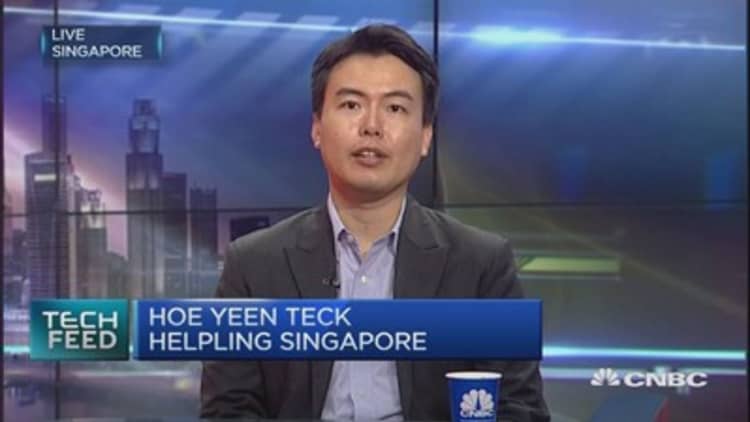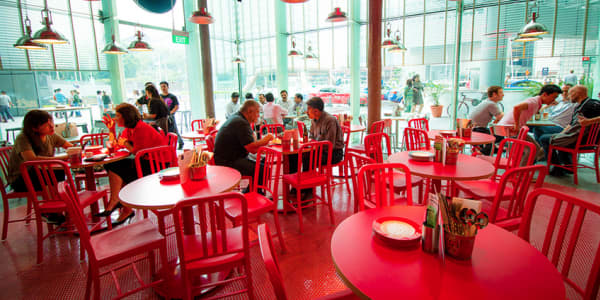The "Uber for cleaners" has swept into Singapore, and it's planning to scrub up an industry it says is full of scams and black-market operators.
Launched in February, the startup has already hoovered up the competition, acquiring competitor startup Spickify, and its co-founder Hoe Yeen Teck.
"The traditional market in Singapore is very unregulated and there are lot of fly-by-night operators and scams… it's a black market which Helpling helps to rectify because we provide a transparent platform," Helpling country manager Hoe said.
Helpling, like Uber, allows users to book a cleaner online and pay automatically through the platform once the job is completed. It charges a flat-fee of 20 Singapore dollars ($15) per hour, with a minimum booking of two hours.
Helpling only hires Singaporeans, vets the cleaners with multiple interviews, provides $1 million insurance coverage and acts as an intermediary to protect both parties.
"We make sure that everyone on our platform has the relevant skills before we hire them – so for customers it's a very safe way to get cleaning services, and for the cleaners we have very a good standing too," Hoe said.
Since 2010 the Singapore government has been actively working to improve the industry of about 1001 cleaning companies, many of which employ foreign workers.
In September 2014 it introduced new law requiring businesses to provide cleaners with written employment contracts, training and a progressive wage plan.

A fair wage for cleaners
Helpling takes 20 percent commission, meaning cleaners working six hours days, five days per week can make just under $2000 per month through the platform, compared to latest statistics from the Ministry of Manpower showing the average monthly wage of cleaners, laborers and related workers to be just $1117.
"For the last two weeks of last month I made about $1600, but I had to put in the work," 29-year-old Shafik said.
Shafik cleans to pay off student-debt from his marketing degree, and to raise money for his upcoming wedding.
While he thought it was a good part-time job, he said it was hard work, and sometimes customers could be cruel.
"They can be very particular and some customers are nice and some are downright nasty. Just know that when you leave [the home] you don't take that job again," said Shafik, who was continuing to look for a full-time job in marketing.
Ministry of Manpower statistics show young Singaporeans are the most in need of work, with the average unemployment of Singaporeans under 30-years-old sitting at 5.2 percent, 3.2 percentage points higher than the national average unemployment rate of 2 percent.
Read MoreTake time to spring clean your budget
Safety for both sides
Like Uber, the customer can review the cleaner. But on Helpling the cleaner cannot review the customer, and Hoe said they have no immediate plans to introduce this function.
Similarly, there are multiple background checks for the cleaner and Helpling covers each of its employees with insurance up to $1 million - the only Singapore cleaner provider to do so. But there are no background checks on customers prior to the cleaner's arrival.
But Hoe said any risk is mitigated by the fact the company has the client's details.
"What we do have is the customer's home information and financial information, they have to open an account with us. So there is a level of assurance for the cleaner because they know when they go to the house there is a third party aware of the cleaning session so if anything goes wrong they can contact us."
This is a step up from the current state of the industry in Singapore, he said.
"Ordinarily if you are doing direct-engagement cleaning, if the customer is unreasonable the cleaner has very little recourse, but in this case a third party like us can act as a mediator," said Hoe.
Repeat Helpling user Ruchi Gupta, is not worried about safety concerns letting a part-time cleaner into her home. "You start to develop trust after a couple of times," said Gupta.
Read MorePortland makes Uber, Lyft legal, for now
Gathering steam?
Still it's unclear how much of a disruptor or threat Helpling is in the industry. Many cleaning firms in Singapore contacted by CNBC say they have not heard of Helpling.
Still, Hoe said Helpling – which has the back of Rocket Internet, the German company known for growing Asian companies like Food Panda and Lazada – has since inception seen week-on-week growth of between 20 and 30 percent to bookings now "in the hundreds," and he expected that to grow.
"There are 1.5 million households in Singapore, and every household needs cleaning. Take away the 200,000 who have full-time maids, and assume most would clean their own home and only 10 percent of the remainder need cleaning.
"That leaves 130,000 that need cleaning, and cleaning needs to be done week-in, week-out, and that's a sizable market," he said.




